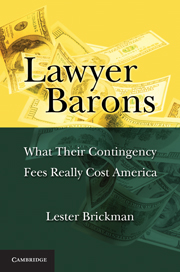Book contents
- Frontmatter
- Contents
- Foreword: Sorting Out Our National Liability Crisis by Richard A. Epstein
- Acknowledgments
- LAWYER BARONS
- Introduction
- 1 The Origin of the Contingency Fee
- 2 How Profitable Are Contingency Fees?
- 3 Are Contingency Fee Profits “Reasonable”?
- 4 How Tort Lawyers Have Increased Their Profits by Restraining Competition
- 5 Why the Market Has Failed to Correct the Absence of Price Competition
- 6 Impediments Imposed by the Bar to Price Competition
- 7 The Effects of Incentives Created by Contingency Fees
- 8 How the Quest for Profits Influenced the Development of the Tort System
- 9 Lawyers' Role in the Expansion of Tort Liability
- 10 The Role of the Judiciary in Tort System Expansion
- 11 Current and Future Expansions of Tort Liability
- 12 The “Litigation Explosion”
- 13 Measures of the Rate of Expansion of Tort Liability
- 14 The Relationship between Injury Rates and Tort System Costs
- 15 The Impacts of Substantial Increases in Tort Lawyers' Effective Hourly Rates
- 16 Class Actions
- 17 Fees in Class Actions
- 18 How Class Action Lawyers Game Fee Setting
- 19 Securities Class Actions
- 20 Regulation through Litigation
- 21 A New Role for Punitive Damages
- 22 For-Profit Partnerships between State Attorneys General and Contingency Fee Lawyers
- Conclusion
- Appendix A A Critique of Alex Tabarrok
- Appendix B Calculating Tort Lawyers' Effective Hourly Rates in 1960
- Appendix C Electronic Discovery and the Use of Contract Lawyers
- Appendix D The HMO Litigation
- Appendix E The GM “Side Saddle” Truck Litigation
- Appendix F Modern Class Actions Undermine Democratic Precepts
- Appendix G Other Ways Lawyers Game Class Action Fees
- Appendix H Nonrecourse Financing of Tort Litigation
- Appendix I Political Contributions by Tort Lawyers and the U.S. Chamber of Commerce
- Appendix J Special Rules Favoring Lawyers
- Appendix K The Ultimate Medical Expense “Buildup”: Whiplash
- Appendix L The Effect of Punitive Damages on Compensatory Awards
- Index
Appendix F - Modern Class Actions Undermine Democratic Precepts
Published online by Cambridge University Press: 05 June 2012
- Frontmatter
- Contents
- Foreword: Sorting Out Our National Liability Crisis by Richard A. Epstein
- Acknowledgments
- LAWYER BARONS
- Introduction
- 1 The Origin of the Contingency Fee
- 2 How Profitable Are Contingency Fees?
- 3 Are Contingency Fee Profits “Reasonable”?
- 4 How Tort Lawyers Have Increased Their Profits by Restraining Competition
- 5 Why the Market Has Failed to Correct the Absence of Price Competition
- 6 Impediments Imposed by the Bar to Price Competition
- 7 The Effects of Incentives Created by Contingency Fees
- 8 How the Quest for Profits Influenced the Development of the Tort System
- 9 Lawyers' Role in the Expansion of Tort Liability
- 10 The Role of the Judiciary in Tort System Expansion
- 11 Current and Future Expansions of Tort Liability
- 12 The “Litigation Explosion”
- 13 Measures of the Rate of Expansion of Tort Liability
- 14 The Relationship between Injury Rates and Tort System Costs
- 15 The Impacts of Substantial Increases in Tort Lawyers' Effective Hourly Rates
- 16 Class Actions
- 17 Fees in Class Actions
- 18 How Class Action Lawyers Game Fee Setting
- 19 Securities Class Actions
- 20 Regulation through Litigation
- 21 A New Role for Punitive Damages
- 22 For-Profit Partnerships between State Attorneys General and Contingency Fee Lawyers
- Conclusion
- Appendix A A Critique of Alex Tabarrok
- Appendix B Calculating Tort Lawyers' Effective Hourly Rates in 1960
- Appendix C Electronic Discovery and the Use of Contract Lawyers
- Appendix D The HMO Litigation
- Appendix E The GM “Side Saddle” Truck Litigation
- Appendix F Modern Class Actions Undermine Democratic Precepts
- Appendix G Other Ways Lawyers Game Class Action Fees
- Appendix H Nonrecourse Financing of Tort Litigation
- Appendix I Political Contributions by Tort Lawyers and the U.S. Chamber of Commerce
- Appendix J Special Rules Favoring Lawyers
- Appendix K The Ultimate Medical Expense “Buildup”: Whiplash
- Appendix L The Effect of Punitive Damages on Compensatory Awards
- Index
Summary
Professor Martin Redish of the Northwestern Law School argues that “in all too many cases, the modern class action has undermined the foundational precepts of American democracy.” This is so because a purportedly procedural device has been conscripted by class action lawyers for use as a means of securing bounties without the legitimacy of substantive authorization. He explains that the class action is a procedural device that allows aggregation of existing individual private rights created by substantive law. But this procedural rule allowing for the creation of class actions, in and of itself, is not a substantive law. The class action
was never designed to serve as a free-standing legal device for the purpose of “doing justice,” nor is it a mechanism intended to serve as a roving policeman of corporate misdeeds or as a mechanism by which to redistribute wealth. Both its structure and description, rather, make clear that it is nothing more than an elaborate procedural device designed to facilitate the enforcement of pre-existing substantive law … If no pre-existing substantive law vests a cause of action in plaintiff class members, they cannot bring a class action suit.
- Type
- Chapter
- Information
- Lawyer BaronsWhat Their Contingency Fees Really Cost America, pp. 517 - 520Publisher: Cambridge University PressPrint publication year: 2011



